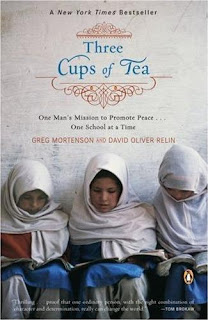Three Cups of Tea by Greg Mortenson
Paperback, 349 pages
Published 2007 by Penguin
I am currently reading the book title "Three Cups of Tea: One Man’s Mission to Promote Peace, One School At A Time" which is about Greg Mortenson's journey to building schools and educating children, especially girls, in remote regions of Pakistan and Afghanistan. It's a brilliant story about a man's journey as a mountain climber who accidentally stumbled upon a small, isolated village in the Himalaya's. Upon leaving the village of Korphe, he promised he would return and build them a school. After several long hard months later, he returns to the village to attempt to build the school. He encounters many setbacks and learns many lessons along the way. Growing up in Africa, as an American, he must learn that the Balti people have survived hundreds of years without the help of outsiders, especially Americans. He soon learns that these people don't need to learn how to live -- they just need help.
Word of what he is doing in Central Asia gets around and with the help of a few wealthy, well-known people in their field, the Central Asia Institute becomes a reality. Visit the website here: http://www.ikat.org/ to learn more about how you can get involved.
Update 2017:
A "60 Minutes" episode addresses the allegations that arose against Mortenson that he fabricated much of the information and events that Three Cups of Tea is based on.
Peter Hessler interviewed Rajeev Goyal and wrote this article for The New Yorker in April 2011.
Jon Krakuer, of Into Thin Air and Into the Wild fame, who was one of Mortenson's earliest supporters, became one of the loudest whistle-blowers of the fabrications. He goes into more details in his book, Three Cups of Deceit: How Greg Mortenson, Humanitarian Hero, Lost His Way, published in July 2011.
Despite these allegations, the message that has stuck with me since finishing this book is that communities thrive when girls and women are educated, but the cultures within Afghanistan and Pakistan do not easily allow "such a thing to happen." Over the years, there is more and more evidence that backs up this "claim." I Google'd "educated girls, better communities" and came up with several articles published in the last few years including a World Bank press release in 2014, Unicef's article Girls' Education: A lifeline to development, a Columbia University blog called State of the Planet published a post called Educated Girls Lead to Empowered Societies, then there's an opinion piece from The Guardian, and Why Educating Girls Makes Economic Sense from Global Partnership for Education.
Paperback, 349 pages
Published 2007 by Penguin
I am currently reading the book title "Three Cups of Tea: One Man’s Mission to Promote Peace, One School At A Time" which is about Greg Mortenson's journey to building schools and educating children, especially girls, in remote regions of Pakistan and Afghanistan. It's a brilliant story about a man's journey as a mountain climber who accidentally stumbled upon a small, isolated village in the Himalaya's. Upon leaving the village of Korphe, he promised he would return and build them a school. After several long hard months later, he returns to the village to attempt to build the school. He encounters many setbacks and learns many lessons along the way. Growing up in Africa, as an American, he must learn that the Balti people have survived hundreds of years without the help of outsiders, especially Americans. He soon learns that these people don't need to learn how to live -- they just need help.
Word of what he is doing in Central Asia gets around and with the help of a few wealthy, well-known people in their field, the Central Asia Institute becomes a reality. Visit the website here: http://www.ikat.org/ to learn more about how you can get involved.
Update 2017:
A "60 Minutes" episode addresses the allegations that arose against Mortenson that he fabricated much of the information and events that Three Cups of Tea is based on.
Peter Hessler interviewed Rajeev Goyal and wrote this article for The New Yorker in April 2011.
Jon Krakuer, of Into Thin Air and Into the Wild fame, who was one of Mortenson's earliest supporters, became one of the loudest whistle-blowers of the fabrications. He goes into more details in his book, Three Cups of Deceit: How Greg Mortenson, Humanitarian Hero, Lost His Way, published in July 2011.
Despite these allegations, the message that has stuck with me since finishing this book is that communities thrive when girls and women are educated, but the cultures within Afghanistan and Pakistan do not easily allow "such a thing to happen." Over the years, there is more and more evidence that backs up this "claim." I Google'd "educated girls, better communities" and came up with several articles published in the last few years including a World Bank press release in 2014, Unicef's article Girls' Education: A lifeline to development, a Columbia University blog called State of the Planet published a post called Educated Girls Lead to Empowered Societies, then there's an opinion piece from The Guardian, and Why Educating Girls Makes Economic Sense from Global Partnership for Education.


No comments:
Post a Comment